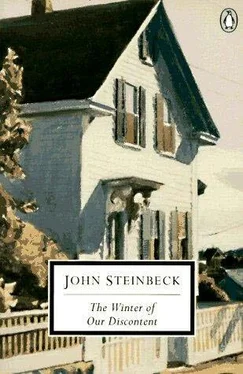“He can wait.”
“He didn’t want to. Will you be late?”
“Can’t tell. Depends on how it goes.”
“Wasn’t it sad about Danny Taylor? Take a raincoat.”
“Sure was.”
In the hall I put on my hat and on an impulse picked old Cap’n’s narwhal cane from the elephant foot. Ellen materialized beside me.
“Can I go with you?”
“Not tonight.”
“I do love you.”
I stared deep into my daughter for a moment. “I love you too,” I said. “I’ll bring you jewels—any favorites?”
She giggled. “You going to carry a cane?”
“For self-protection.” I held the spiraled ivory at parry, like a broadsword.
“You going to be gone long?”
“Not long.”
“Why do you take the cane?”
“Pure decoration, a boast, a threat, a fear, a vestigial need to bear arms.”
“I’ll wait up for you. Can I hold the pink thing?”
“Oh, no you won’t, my little dung-flower. Pink thing? You mean the talisman? Sure you may.”
“What’s a talisman?”
“Look it up in the dictionary. Know how to spell it?”
“T-a-l-e-s-m-a-n.”
“No, t-a-l- i -s-m-a-n.”
“Why don’t you tell me?”
“You’ll know it better if you look it up.”
She locked her arms around me and squeezed and as quickly let me go.
The night closed thick and damp about me, humid air about the consistency of chicken broth. The street lights hiding among the fat leaves of Elm Street sprouted damp, hairy halos of moisture.
A man with a job sees so little of the normal daylight world. No wonder he must get his news and his attitudes from his wife. She knows what happened and who said what about it, but it is strained through her womanness, wherefore most working men see the daylight world through women’s eyes. But in the night, when his store or his job is closed, then is a man’s world risen—for a time.
The twisted staff of narwhal ivory felt good in my hand, its heavy silver knob polished by old Cap’n’s palm.
Once long ago when I lived in a daylight world, the world being too much with me, [76] the world being too much with me… peace: William Wordsworth’s sonnet “The World Is Too Much with Us” and allusions to Walt Whitman’s Leaves of Grass.
I would have gone to grass. Face downward and very close to the green stems, I became one with ants and aphids and sow bugs, no longer a colossus. And in a ferocious jungle of the grass I found the distraction that meant peace.
Now in the night I wanted Old Harbor and the Place, where an inevitable world of cycles of life and time and of tide could smooth my raggedness.
I walked quickly to the High Street, and only glanced across at my green-curtained store as I passed the Foremaster. In front of the fire station fat Willie sat in the police car, red of face and sweating like a pig.
“You on the prowl again, Eth?”
“Yep.”
“Terrible sad about Danny Taylor. Nice fella.”
“Terrible,” I said and hurried on.
A few cars cruised about, building a breeze, but there were no strollers. No one risked the sweat of walking.
I turned at the monument and walked toward Old Harbor and saw the anchor lights of a few yachts and offshore fishing craft. Then I saw a figure turn out of Porlock Street and come toward me and I knew by walk and posture it was Margie Young-Hunt.
She stopped in front of me, gave me no chance of passing. Some women can look cool on a hot night. Perhaps it was the breezy movement of her cotton skirt.
She said, “I guess you’re looking for me.” She replaced a strand of hair that wasn’t out of place.
“Why do you say that?”
She turned and took my arm and with her fingers urged me to walk on. “That’s the kind I get. I was in the Foremaster. I saw you go by and I thought you might be looking for me, so I whipped around the block and intercepted you.”
“How’d you know which way I would turn?”
“I don’t know. I knew. Listen to the cicadas—that’s more hot weather and no wind. Don’t worry, Ethan, we’ll be out of the light in a moment. You can come to my place if you want. I’ll give you a drink—a tall cold drink, from a tall hot woman.”
I let her fingers guide me into the shadows of a grove of outgrown privet. Some kind of yellow blossoms near the ground burned the darkness.
“This is my house—a garage with a pleasure dome over it.”
“What makes you think I was looking for you?”
“Me or someone like me. Ever see a bullfight, Ethan?”
“Once at Arles just after the war.”
“My second husband used to take me. He loved them. I think bullfights are for men who aren’t very brave and wish they were. If you saw one you’ll know what I mean. Remember after all the cape work when the bull tries to kill something that isn’t there?”
“Yes.”
“Remember how he gets confused and uneasy, sometimes just stands and looks for an answer? Well, then they have to give him a horse or his heart will break. He has to get his horns into something solid or his spirit dies. Well, I’m that horse. And that’s the kind of men I get, confused and puzzled. If they can get a horn into me, that’s a little triumph. Then they can go back to muleta and espada. ” [77] muleta and espada: A muleta is a red cloth attached to a stick, used by matadors; an espada is a matador’s sword.
“Margie!”
“Just a moment. I’m trying to find my key. Smell the honeysuckle!”
“But I’ve just had a triumph.”
“You have? Hooked a cape—trampled it?”
“How do you know?”
“I just know when a man is looking for me, or some other Margie. Watch the stairs, they’re narrow. Don’t hit your head at the top. Now, here’s the switch—you see? A pleasure dome, soft lights, smell of musk—down to a sunless sea!” [78] A pleasure dome… down to a sunless sea!: From “Kubla Khan; or, a Vision in a Dream” (1816) by Samuel Taylor Coleridge (1772-1834). “In Xanadu did Kubla Khan / A stately pleasure dome decree: / Where Alph, the sacred river, ran / Through caverns measureless to man / Down to a sunless sea.”
“I guess you’re a witch all right.”
“You know goddam well I am. A poor, pitiful small-town witch. Sit there, near the window. I’ll turn on the fake breeze. I’m going to what they call ‘slip into something comfortable,’ then I’ll get you a tall cool skull-buster.”
“Where’d you hear that word?”
“You know where I heard it.”
“Did you know him well?”
“Part of him. The part of a man a woman can know. Sometimes that’s the best part, but not often. It was with Danny. He trusted me.”
The room was a memory album of other rooms, bits and pieces of other lives like footnotes. The fan at the window made a small whispering roar.
She came back soon in long, loose, billowing blue and brought a cloud of scent. When I breathed it in she said, “Don’t worry. It’s a cologne Mary has never smelled on me. Here’s a drink—gin and tonic. I rubbed the glass with tonic. It’s gin, just gin. If you rattle the ice, you’ll think it’s cool.”
I drank it down like beer and felt its dry heat reach out over my shoulders and down my arms so that my skin shimmered.
“I guess you needed that,” she said.
“I guess so.”
“I’ll make a brave bull of you—enough resistance so you’ll think you have a triumph. That’s what a bull needs.”
I stared at my hands, crisscrossed with scratches and tiny cuts from opening boxes, and my nails, not too clean.
She took the ivory stick from the couch where I had dropped it. “I hope you don’t need this for your drooping passion.”
Читать дальше











